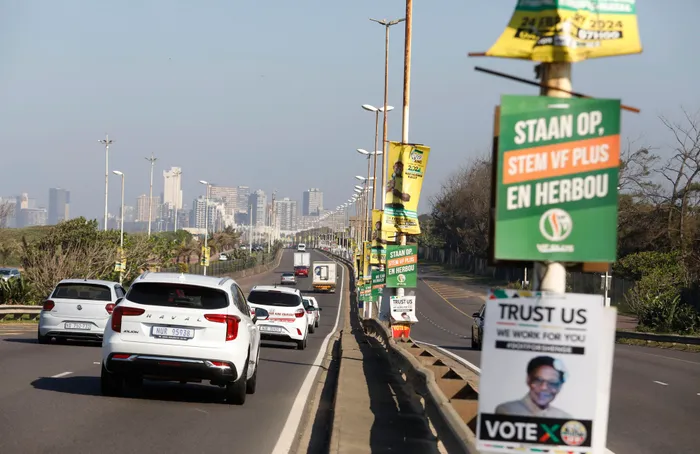Party leaders playing the race card on a slippery slope

Political parties’ campaign posters on the Durban M4 as the National General elections day draws closer. A trend is gradually emerging among some minority political parties, such as the FF that are fixated on advancing the interests of specific racial groups instead of raising national issues as is expected of all political parties. – Picture: Doctor Ngcobo / Independent Newspapers
By Bheki Mngomezulu
Chapter 2, Section 19 (1) of the Constitution of the Republic of South Africa states that every citizen in this country has the right to form a political party, to participate in the activities of, or recruit members for, a political party, and has the right to campaign for a political party or cause.
This constitutional imperative does not distinguish between majority (big) or minority (small) political parties. They are all subjected to the same principle and are treated in the same manner. The expectation is that leaders of all political parties would adhere to the constitutional imperatives regardless of the size of the political parties they lead.
But while political parties have the right to do all the things that are contemplated in the Constitution, the onus is on their leaders to ensure that their actions do not deviate from the resolve to work towards the broader agenda of nation-building and social cohesion. National unity should take precedence. When political leaders address racial issues, they should do so being mindful of the broader national project.
As the country readies itself for the May 29 general election, various political parties are hard at work selling themselves to the electorate. Noticeably, a trend is gradually emerging among some minority political parties. Instead of raising national issues as is expected of all political parties, they are fixated on advancing the interests of specific racial groups. This practice is a nemesis to democratic consolidation, nation-building and social cohesion.
Gayton McKenzie, leader of the Patriotic Alliance, has been vocal and explicit about his concern that the coloured community has been ignored after 1994. In his campaigns, he does not obfuscate or mince his words about fighting for the plight of the coloured community. He states categorically that he is determined to advance the cause of the coloured people whose needs and interests have been ignored by other political parties since 1994, according to his assessment.
This strategy might work for him in the short term. But historically both the DA and the GOOD Party have appealed to the coloured community under the guise of advancing their interests. If up to now these interests have not been served, what would make McKenzie believe that his call will not face the same fate soon? When that happens, then what?
If the other two parties benefited from the coloured vote but later lost their support, what were the causal factors? Can McKenzie’s party be insulated from such factors? These are some of the critical questions that are worth addressing before making any hasty decision or pronouncement.
For its part, the Freedom Front Plus (FF+) has been consistent in fighting for Afrikaans-speaking whites. This is the reason why the party has grown at the expense of the DA which tried to be liberal and started accommodating other racial groups. The conservative elements within the DA opted out and found a new home in the FF+ which seemed specifically concerned about the plight of Afrikaners.
In the eyes of the FF+ Afrikaners have been ignored by the black-led government under the new political dispensation. Like the DA, FF+ is averse to both affirmative action and BBBEE (broad-based black economic empowerment) on the grounds that these policies discriminate against white South Africans in general but Afrikaners in particular. These are the same people who embraced legislation such as the Job Reservation Act or Colour Bar Act of 1926, Population Registration Act of 1950, and many other discriminatory pieces of legislation.
If FF+ appeals to a specific racial group and loses an election as has been the case before, how does it expect these white Afrikaners to be treated after the election? If they are ostracised, ignored, or undermined, will the leadership take full responsibility for that? Importantly, how would that promote social cohesion and nation-building? These are some of the questions with which the political leadership of the FF+ must contend and ruminate.
As if vowing not to be outdone by the other two parties, the Minority Front is clear about fighting for the well-being of minority communities, more especially its Indian constituency. This party too does not work for the general South African population. Instead, it advances the interests of selected groups of people along racial lines. Such tendencies do not contribute towards social cohesion and nation-building.
Something is intriguing about these three racial groups mentioned above. The Afrikaners benefited immensely in this country politically, economically, and otherwise. Even when the National Party thought about accommodating other racial groups, it deliberately ignored the black majority. Instead, it welcomed coloureds and Indians, albeit on a limited scale.
In this regard, the 1983 South African Constitution resulted in the establishment of the Tricameral Parliament in 1984. This development gave a limited political voice to both coloureds and Indians. Coloureds occupied the 80-seat House of Representatives while Indians occupied the House of Delegates. Only blacks were left out in the cold.
The Interim Constitution of the Republic of South Africa, which was adopted in 1993, and the current Constitution which was adopted in 1996, deliberately envisioned South Africa as one. It did not discriminate against anyone based on race, gender, or religious and political orientation.
Therefore, while these minority parties have the right to exist, they must tread carefully when dealing with racial issues.
Prof Bheki Mngomezulu is Director of the Centre for the Advancement of Non-Racialism and Democracy (CANRAD) at the Nelson Mandela University